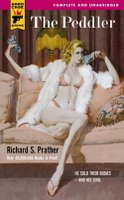 During the 1950s, Richard S. Prather was America’s second-most-successful private eye fictionist, just behind Mickey Spillane. His Hollywood gumshoe, the buzz-cut and surprisingly sanguine Sheldon “Shell” Scott, “appeared in a long string of over three dozen Fawcett/Gold Medal PBOs [paperbacks only], collections and countless short stories, and even lent his name to Shell Scott Mystery Magazine,” recalls Kevin Burton Smith at The Thrilling Detective Web Site. Yet Prather, who is now 85 years old, and whose last new novel, Shellshock, was published back in 1987 (a year after he received the Mystery Writers of America’s Lifetime Achievement Award), isn’t well remembered by most of today’s crime-fiction enthusiasts. Hard Case Crime’s recent re-release of his 1952 standalone, The Peddler (boasting cover art by Robert McGinnis, who also supplied the illustrations for many of Prather’s early paperbacks), is likely to send some younger readers into library back corners in search of his other works, or maybe off to E-Reads, which has made a number of the Shell Scott novels available again through electronic and print publication. However, a generation reared on CSI, Monk, and Veronica Mars may find Prather’s tales a bit dated and skimpy on forensic details.
During the 1950s, Richard S. Prather was America’s second-most-successful private eye fictionist, just behind Mickey Spillane. His Hollywood gumshoe, the buzz-cut and surprisingly sanguine Sheldon “Shell” Scott, “appeared in a long string of over three dozen Fawcett/Gold Medal PBOs [paperbacks only], collections and countless short stories, and even lent his name to Shell Scott Mystery Magazine,” recalls Kevin Burton Smith at The Thrilling Detective Web Site. Yet Prather, who is now 85 years old, and whose last new novel, Shellshock, was published back in 1987 (a year after he received the Mystery Writers of America’s Lifetime Achievement Award), isn’t well remembered by most of today’s crime-fiction enthusiasts. Hard Case Crime’s recent re-release of his 1952 standalone, The Peddler (boasting cover art by Robert McGinnis, who also supplied the illustrations for many of Prather’s early paperbacks), is likely to send some younger readers into library back corners in search of his other works, or maybe off to E-Reads, which has made a number of the Shell Scott novels available again through electronic and print publication. However, a generation reared on CSI, Monk, and Veronica Mars may find Prather’s tales a bit dated and skimpy on forensic details.Fortunately, for those curious to know more about Scott and his creator, Linda Pendleton, the widow of pulp novelist Don Pendleton, has posted a fresh and satisfyingly long interview with Prather at her husband’s official site. The subject matter of their exchange ranges all over the map, from Prather’s childhood and writing “rules,” to his thoughts on supportive spouses and “channeled wisdom,” to his as-yet-unpublished, 1,000-page Shell Scott manuscript, The Death Gods. But the section I most enjoyed reading was his response to what is a classic reader question to authors: In what ways is your protagonist like you, and in what ways is he not? Prather answers:
I created Shell Scott as essentially a light-hearted, optimistic, happy-go-lucky fellow, and from the beginning I wanted my books--even though they’re mystery novels about murder and crimes and troubles and crooks--to reflect that upbeat attitude, to focus more on the “mystery” than the “murder,” more on the approaching light than the gathering darkness. There’s always enough misery in the world, and I didn’t want to add more to it.You can--and should--read the entire interview here.
So, OK, sure, to a degree Shell Scott is “me, operating from the same worldview,” but only to a degree. Certainly I’ve given Shell qualities like integrity, self-reliance, courage, love of truth and justice, that I consider admirable in him--or anyone else--along with a few flaws and foibles to make him seem more human, like us ordinary people. But he isn’t “ordinary,” and isn’t supposed to be. For an obvious example, he’s a lot bigger and stronger and braver than I am. But we authors know (or should know) that our Heroes or Heroines are ten feet tall and invincible, even if we’re not. Because we want (or should want) to write about extraordinary people living extraordinary lives, and thus give our readers relief for a while from what are often Thoreau’s “lives of quiet desperation” punctuated by shopping at the supermarket and paying the monthly bills. We’re avenues of temporary escape for them, just as other authors (especially if they lift our spirits instead of depressing them) are respite for us fellow scribblers.
So, yes, I’d like to say that Shell Scott’s virtues, his good humor and honesty and ingenuity and optimism, and his belief that all women are Goddesses, are positive qualities that he inherited in part from his creator. But we can’t stop there, can we? If we authors profess that our admirable Heroes reflect much of what we ourselves are, we have to be consistent and also admit that the most villainous characters we’ve invented must reflect much of the darkness and “evil” that’s somewhere within ourselves. So the negative qualities of my numerous bad guys (and gals)--their crookedness, dishonesty, greed, cruelty, nastiness and so on ad infinitum--must have come from somewhere within me, and my experiences of many lifetimes, or I wouldn’t have been able to pass them on to my fictional progeny. After all, I created those villains too, didn’t I?
(Hat tip to Mystery*File’s Steve Lewis.)

















No comments:
Post a Comment